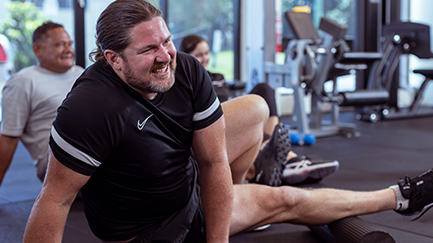
Supporting veterans through service related injuries
The Mates4Mates physical rehabilitation team is here to help veterans improve mobility, manage pain and enhance their overall wellbeing.

When used together, psychological wellbeing practices, such as mindfulness and gratitude, can often provide a range of benefits.
It can help balance perspective, improve wellbeing, reduce the likelihood of intense reactions to challenging situations and assist in navigating some of life’s challenges. These tools can be particularly beneficial for veterans impacted by service.
Mindfulness is the practice of becoming mentally present, observing your environment, emotions, feelings, and experiences without judgement, and using this technique to refocus on the current moment.
Gratitude is taking time to focus on and acknowledge positives, being thankful and willing to show appreciation for what one has.
Practicing mindfulness and gratitude
There are a number of ways that you can practice mindfulness and gratitude, including:
The benefits for those in the Defence community
People who have served in the Defence Force can experience significant stressors as a result of their role in the military, whether from the impacts on family, managing physical injuries, frequently being away from home, or other challenges.
These stressors can impact on the nervous system, creating a ‘stress response’ where the brain and body work together to protect the individual. This can lead to the stress response system, and associated release of stress hormones, become easier to trigger and harder to switch off.
Dedicating even five minutes a day to practicing mindfulness and gratitude can help regulate the nervous system and alter pathways in the brain to reduce reactions to stressors, leading to an improved sense of wellbeing, reduced symptoms of mental health disorders, improved clarity, and an improvement in mood.
Practicing mindfulness and gratitude is also a proven strategy to improve physical health, and can contribute to lowering blood pressure, improving sleep, digestion, and immune function, and decreasing muscle tension, thereby reducing pain.
While there are both physical and psychological benefits, these practices also invite more joy and happiness into our lives and can improve our overall wellbeing.
Ways to include more mindfulness and gratitude in your life
Support at Mates4Mates
Mates4Mates offers mindfulness practices in some of our programs, including our One-Day and Four-Day Wellness Programs for Mates and family members.
The techniques and tools facilitated in the programs are clinical-based practices designed to reduce stress and improve wellbeing, and may include:
Mates4Mates also offers trauma-informed yoga sessions, focusing on simple meditation techniques and stretching to bring a sense of calmness to the mind and body.
To find out more, reach out to Mates4Mates on 1300 4 MATES (62 837) for a confidential chat.
Written by Stacey Gillam, Mates4Mates Counsellor

The Mates4Mates physical rehabilitation team is here to help veterans improve mobility, manage pain and enhance their overall wellbeing.